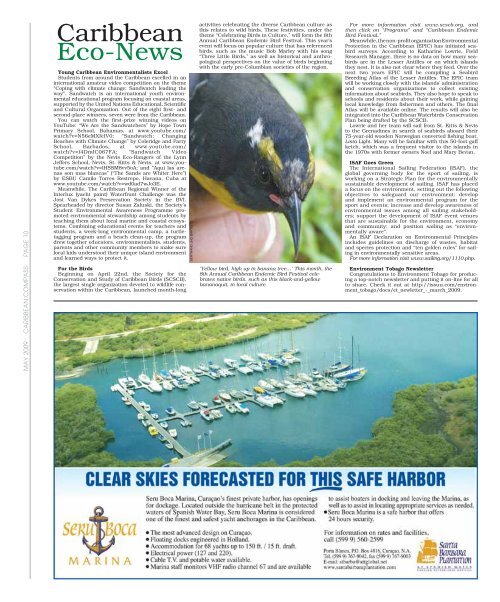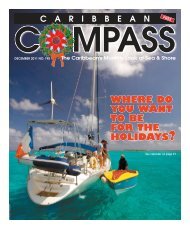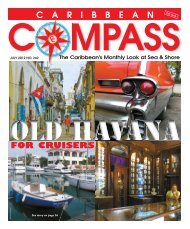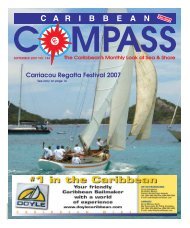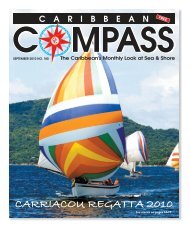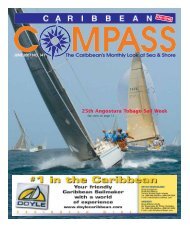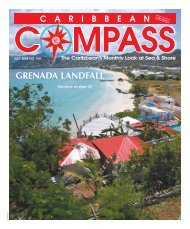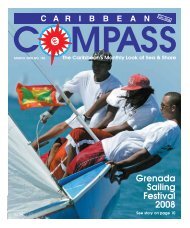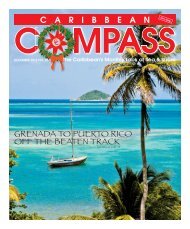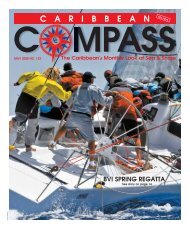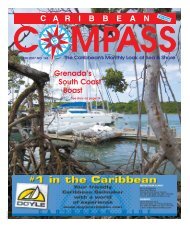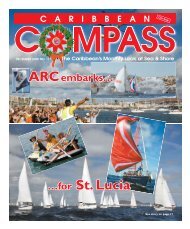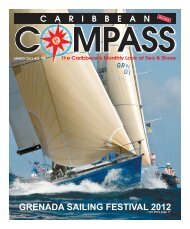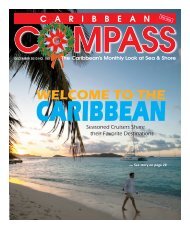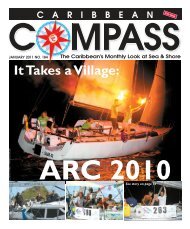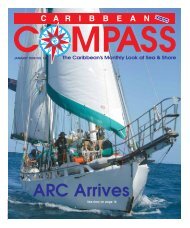Create successful ePaper yourself
Turn your PDF publications into a flip-book with our unique Google optimized e-Paper software.
MAY <strong>2009</strong> CARIBBEAN COMPASS PAGE 10<br />
<strong>Caribbean</strong><br />
Eco-News<br />
Young <strong>Caribbean</strong> Environmentalists Excel<br />
Students from around the <strong>Caribbean</strong> excelled in an<br />
international amateur video competition on the theme<br />
“Coping with climate change: Sandwatch leading the<br />
way”. Sandwatch is an international youth environmental<br />
educational program focusing on coastal areas,<br />
supported by the United Nations Educational, Scientific<br />
and Cultural Organization. Out of the eight first- and<br />
second-place winners, seven were from the <strong>Caribbean</strong>.<br />
You can watch the first-prize winning videos on<br />
YouTube: “We Are the Sandwatchers” by Hope Town<br />
Primary School, Bahamas, at www.youtube.com/<br />
watch?v=N56eMXfeIV0; “Sandwatch: Changing<br />
Beaches with Climate Change” by Coleridge and Parry<br />
School, Barbados, at www.youtube.com/<br />
watch?v=f4DmlC067FA; “Sandwatch Video<br />
Competition” by the Nevis Eco-Rangers of the Lynn<br />
Jeffers School, Nevis, St. Kitts & Nevis, at www.youtube.com/watch?v=lHSSM8vv5oA;<br />
and “Aqui las arenas<br />
son mas blancas” (“The Sands are Whiter Here”)<br />
by ESBU Camilo Torres Restrepo, Havana, Cuba at<br />
www.youtube.com/watch?v=wd0ad7wJo3E.<br />
Meanwhile, The <strong>Caribbean</strong> Regional Winner of the<br />
Interlux (yacht paint) Waterfront Challenge was the<br />
Jost Van Dykes Preservation Society in the BVI.<br />
Spearheaded by director Susan Zaluski, the Society’s<br />
Student Environmental Awareness Programme promoted<br />
environmental stewardship among students by<br />
teaching them about local marine and coastal ecosystems.<br />
Combining educational events for teachers and<br />
students, a week-long environmental camp, a turtletagging<br />
program and a beach clean-up, the program<br />
drew together educators, environmentalists, students,<br />
parents and other community members to make sure<br />
local kids understood their unique island environment<br />
and learned ways to protect it.<br />
For the Birds<br />
Beginning on April 22nd, the Society for the<br />
Conservation and Study of <strong>Caribbean</strong> Birds (SCSCB),<br />
the largest single organization devoted to wildlife conservation<br />
within the <strong>Caribbean</strong>, launched month-long<br />
BERTRAND JNO BAPTISTE<br />
activities celebrating the diverse <strong>Caribbean</strong> culture as<br />
this relates to wild birds. These festivities, under the<br />
theme “Celebrating Birds in Culture,” will form the 8th<br />
Annual <strong>Caribbean</strong> Endemic Bird Festival. This year’s<br />
event will focus on popular culture that has referenced<br />
birds, such as the music Bob Marley with his song<br />
“Three Little Birds,” as well as historical and anthropological<br />
perspectives on the value of birds beginning<br />
with the early pre-Columbian societies of the region.<br />
‘Yellow bird, high up in banana tree…’ This month, the<br />
8th Annual <strong>Caribbean</strong> Endemic Bird Festival celebrates<br />
native birds, such as this black-and-yellow<br />
bananaquit, in local culture<br />
For more information visit www.scscb.org, and<br />
then click on “Programs” and “<strong>Caribbean</strong> Endemic<br />
Bird Festival.”<br />
Meanwhile, the non-profit organization Environmental<br />
Protection in the <strong>Caribbean</strong> (EPIC) has initiated seabird<br />
surveys. According to Katharine Lowrie, Field<br />
Research Manager, there is no data on how many seabirds<br />
are in the Lesser Antilles or on which islands<br />
they nest. It is also not clear where they feed. Over the<br />
next two years EPIC will be compiling a Seabird<br />
Breeding Atlas of the Lesser Antilles. The EPIC team<br />
will be working closely with the islands’ administration<br />
and conservation organizations to collect existing<br />
information about seabirds. They also hope to speak to<br />
schools and residents about their work, while gaining<br />
local knowledge from fishermen and others. The final<br />
Atlas will be available online. The results will also be<br />
integrated into the <strong>Caribbean</strong> Waterbirds Conservation<br />
Plan being drafted by the SCSCB.<br />
Lowrie and her team will sail from St. Kitts & Nevis<br />
to the Grenadines in search of seabirds aboard their<br />
75-year-old wooden Norwegian converted fishing boat,<br />
Lista Light. Many will be familiar with this 50-foot gaff<br />
ketch, which was a frequent visitor to the islands in<br />
the 1970s with former owners Noel and Mary Bevan.<br />
ISAF Goes Green<br />
The International Sailing Federation (ISAF), the<br />
global governing body for the sport of sailing, is<br />
working on a Strategic Plan for the environmentally<br />
sustainable development of sailing. ISAF has placed<br />
a focus on the environment, setting out the following<br />
objectives to safeguard our environment: develop<br />
and implement an environmental program for the<br />
sport and events; increase and develop awareness of<br />
environmental issues among all sailing stakeholders;<br />
support the development of ISAF event venues<br />
that are sustainable for the environment, economy<br />
and community; and position sailing as “environmentally<br />
aware”.<br />
An ISAF Declaration on Environmental Principles<br />
includes guidelines on discharge of wastes, habitat<br />
and species protection and “ten golden rules” for sailing<br />
in environmentally sensitive areas.<br />
For more information visit www.sailing.org/1110.php.<br />
Environment Tobago Newsletter<br />
Congratulations to Environment Tobago for producing<br />
a top-notch newsletter and putting it on-line for all<br />
to share. Check it out at http://issuu.com/environment_tobago/docs/et_newletter_-_march_<strong>2009</strong>.


